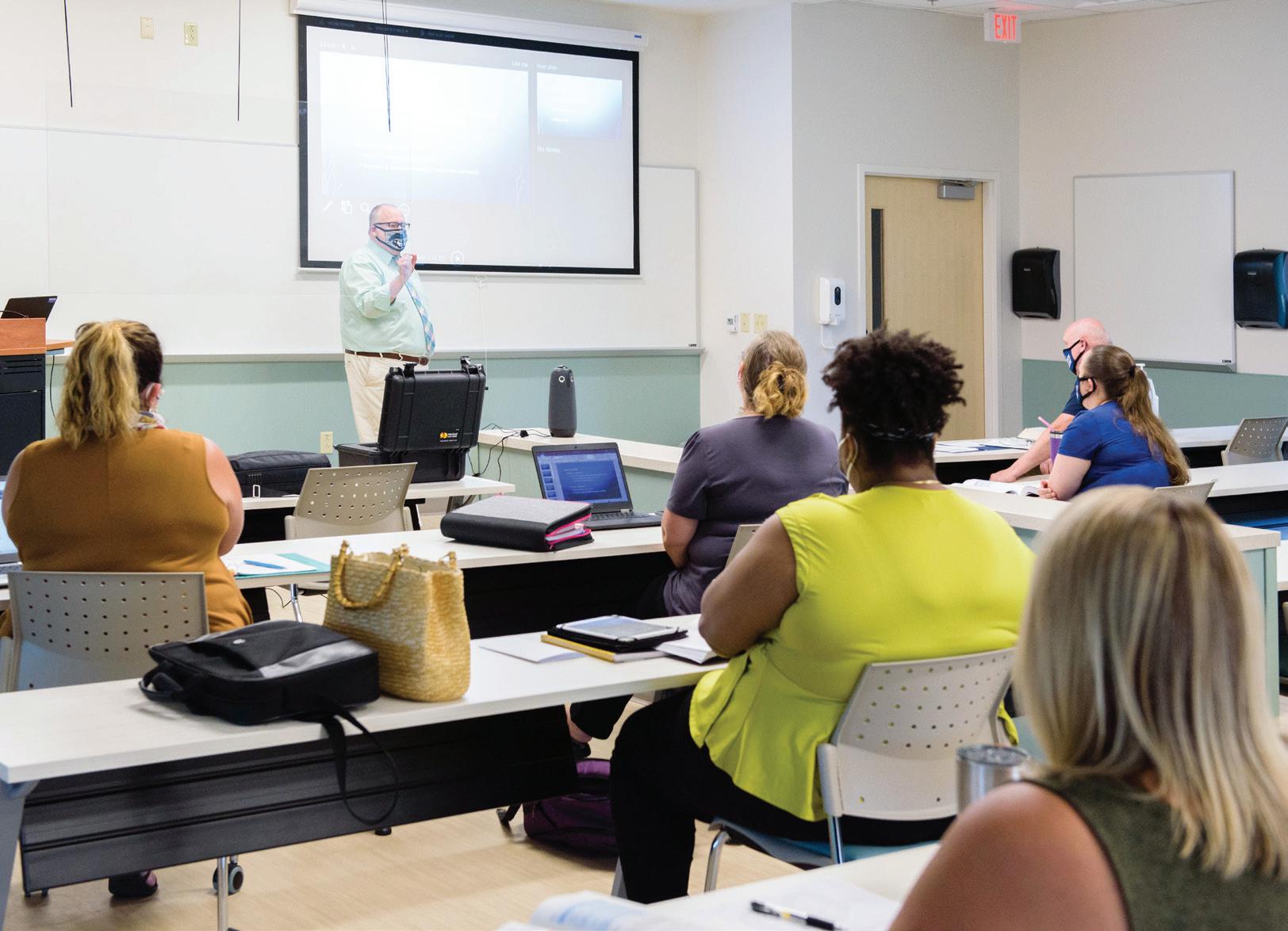
4 minute read
Creative Coping Continues
CREATIVE COPING CONTINUES SEMESTER By Jan Joslin / Photos by Richard Esposito
FOR FALL
Advertisement
All summer Charleston Southern leadership joined the thousands of other university leaders across the country in wrestling with whether to return to campus or stay completely online for fall 2020.
A new normal – being flexible, fluid, and creative – helped CSU open the campus early with the plan to cancel Fall Break and finish the semester completely right before Thanksgiving, giving students a longer Christmas break and hopefully minimizing the flow of students between home and campus.
“While leading in the midst of a pandemic is not where we wanted to be this year, it has served as an excellent reminder of how blessed we are to be part of this campus community, one where we can rely on the smarts of our colleagues and the wisdom of our Lord,” said President Dr. Dondi Costin.
Here’s just a glimpse into the hours of work that went into reopening.
University Infection Control & COVID-19 Coordinator
Senior leadership named Laurel A. Glover to a newly created position, University Infection Control and COVID-19 Coordinator. Glover, DHSc(C), MPH, RCP, RRT-NPS, is assistant professor of public health. After training as a Respiratory Care Practitioner, she continued her education with a Master of Public Health from Liberty University. She is currently a Doctor of Health Sciences in Global Health candidate at A.T. Still University.
Glover has worked with community- and hospital-based health programs throughout the U.S., Central America, the Caribbean, and Asia, providing education and consultation services along the way. Adding to her years of experience in the clinical environment, Glover spent time in the spring serving at NYU in support of COVID-19 pandemic relief efforts in New York City. Her expertise in the pandemic environment has only increased her passion for healthcare, specifically educating others in the importance of preventive measures. As the point person on campus for all COVID-19-related
Dr. George Metz teaches a class in the Doctor of Education program in a socially distanced classroom.
activities, Glover has put in hours and hours answering questions, evaluating possible symptoms, and answering emails from students, employees, and parents.
#BUCSAFE Campaign
The University Pandemic Task Force, led by Dr. Jackie Fish, vice president for academic affairs, has put in countless hours alongside Glover. The task force and its multiple subcommittees represent personnel from the Physician Assistant program, Public Health, Nursing, Kinesiology, Athletics, Student Life, and Academics.
In order to provide cohesive and encouraging communication around campus, the task force launched a #BUCSAFE campaign featuring a #BUCSAFE pledge that demonstrates our shared responsibility and mutual commitment to the health of every student, faculty, and staff member. The Marketing and Communication department developed posters, signs, and other tools to help promote the campaign. These reminders were installed around campus to encourage everyone to be proactive in keeping others safe. Loving your neighbor as yourself is more than a motto on our campus. It is a way of life. Face coverings and maintaining six feet of distance are a way of life, too.
LiveSafe App and Screening Protocols
CSU entered into a contract with LiveSafe, an electronic platform which provides mobile health screening capabilities, reliable and effective two-way safety communications, and the ability to provide resources in response to rapidly changing health conditions, guidance, and regulations. The app is used by students and employees before leaving their dorm rooms or homes each day.
Bucs Win masks and social distancing are the norm in the classroom.
Classroom Instruction
Under the leadership of Fish and the academic deans, the task force created a plan that is allowing for as much in-person classroom instruction as possible. All classrooms were reconfigured to accommodate six feet of social distancing whenever possible, as recommended by SCDHEC in their guidelines for Institutions of Higher Education.
While a few courses are completely online, all coursework is recorded for students who do not feel comfortable participating in on-campus activities and for those who may be sick or may have been exposed.
Student Life
Members of the Student Life team and auxiliary services such as food services have adapted and worked to maintain as normal a semester as possible despite the pandemic.

No more than two people are living in each dorm room; the dining hall has a distanced seating arrangement; Chapels are all online for now; and outdoor gathering spaces are available for distanced interacting outside of class.
Plans include isolation rooms for any students contracting COVID-19, and quarantine plans put in place for those who were exposed to someone positive. The number of cases went up after classes started but has continued to come down as the campus was encouraged to remain diligent.
Survive and Advance
Costin likes to say we first started dealing with COVID in the middle of what should have been March Madness. He has adopted the March Madness motto of survive and advance. He has viewed fall semester in two week increments – survive two weeks and advance – to make it to semester’s end.
Costin said one of the things he has most appreciated during the pandemic is the collegial sharing of ideas among college presidents, chief academic officers, athletic directors, and more. “I have a whole new appreciation for collegiality,” said Costin.
During COVID-19, Costin still maintains his practice of talking to students every day. Despite the difficulties, students have been mostly positive. He said a recurring theme is students who say, “I’m excited to be here because this is really better than living in my high school bedroom.”
And in the midst of a drastically different fall semester, the task force is busy working out a plan for spring 2021.










